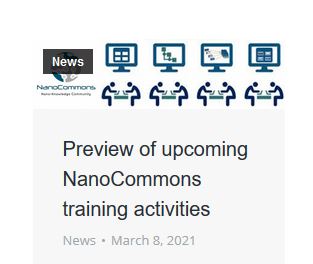 >
NanoCommons Project – Upcoming Training activities in 2021
>
NanoCommons Project – Upcoming Training activities in 2021

Building on the hugely successful set of webinars and online training events in 2020, the EU H2020 project NanoCommons is running a number of virtual training events in 2021. The formats will vary from webinar style presentations to more hands-on guided activities where the NanoCommons tools and services are presented and participants have the opportunity to work with real datasets and to apply the tools and approaches directly. Some of the successful events from last year will also be re-run this year to widen the pool of users for the tools and approaches.
Check out the NanoCommons Website for further Updates and details on the upcoming events www.nanocommons.eu/
March 20201 : WEBINAR “Online SPARQL Access to WikiPathways and AOP-Wiki Webinar”, 23.03.2021, 15:00 till 16:00 h CET
NanoCommons and NanoSolveIT will offer a webinar on the use of linked data resources such as WikiPathways and AOP-Wiki. Linked data is basically structured data which is interlinked with other data so it becomes more useful through semantic queries. One way of doing this is through the integration of databases through RDF (Resource Description Framework, the standard model for data interchange) using the newly developed User Interfaces for WikiPathways and AOP-Wiki, providing a variety of useful features to facilitate exploring the databases and linking their data with other resources. The new features include a flexible, auto-populated query panel, SPARQL syntax highlighting, permalinks for SPARQL queries, and full-screen mode. The webinar will focus on the usability of the interface by walking through the various functionalities, and showing a variety of example queries against the WikiPathways1 and AOP-Wiki data2. Furthermore, federated queries across resources will be executed to illustrate the strength of linked data. The webinar is for everyone who wants to learn how to use linked data resources such as WikiPathways and AOP-Wiki, and no preparations are necessary. The expected duration is 45 minutes with time for discussion and support with queries afterwards.
- Link for Registration : https://attendee.gotowebinar.com/register/1429123637065255181
April 2021: WORKSHOP “In Silico Nanoroxicology”, 13.04.2021
NanoCommons will offer an entry-level workshop on in silico nanotoxicology, providing users with easy (no installations required) access to Jaqpot3, a powerful and versatile nanotoxicological in silico prediction platform, enabled through powerful Google Colab notebooks. Users will receive training from the expert team from the National Technical University of Athens, who developed the platform, on how to develop a Quantitative Structure-Activity Relationship (QSAR) model and publish it as a web application through the Jaqpot platform with minimal programming skills requirements. Models built on Jaqpot can be used over the graphical user interface or across platforms over the API and can be shared to groups with controlled access and rights.
May 2021 : TRAINING Session on “concept of adverse outcome pathways and molecular initiating events”, exact date to be confirmed
NanoCommons and SmartNanoTox will offer a training session dedicated to the concept of adverse outcome pathways and molecular initiating events. A number of prediction models for molecular initiating events, such as (i) disruption of lung surfactant functionality, (ii) lysosomal destabilization, and (iii) oxidation of cell membrane have been generated by the SmartNanoTox team, waiting for experimental validation based on data from other researchers in the field. Combining in vitro data with results from in silico modeling our learning may be enriched and contribute to read-across to other types of nanomaterials showing similar characteristics. Moreover, in silico models may in the future be optimized based on such correlation attempts.
Further Contact:
- Prof. Iseult Lynch, University of Birmingham UK https://sciprofiles.com/profile/370970
- Prof. Marin Himly, University of Salzburg AT https://orcid.org/0000-0001-5416-085X